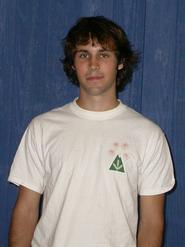
Timothy Eddy '07 (Pittsfield, Mass.) is on the Hill for summer research into a country far, far away. His Levitt research will focus on the increasingly complicated and contradictory nature of U.S.-Uzbek relations, as well as the implications of this relationship on U.S. foreign policy and security overseas. Advised by Sharon Rivera, assistant professor of government, Eddy is working on a project titled "The Andijon Massacre: A Major Setback in U.S.-Uzbek Relations?"
U.S.-Uzbek relations are important, since Uzbekistan allows the U.S. to use military bases near the Afghan border. There is a contradiction implicit in the U.S. activity in Uzbekistan, a contradiction which has been apparent ever since the sixties. The U.S. has a history of championing and supporting democracy internationally, but also of condoning repressive or authoritarian regimes. As Eddy explains in his proposal, the U.S. speaks for democracy abroad but has supported the Shah in Iran, General Pinochet in Chile, and Ferdinand Marcos in the Philippines.
Uzbekistan is, Eddy explains, under a highly undemocratic regime, one which the U.S. has made little effort to reform despite their vocal interest in world democracy. The balance has, however, changed recently. In May 2005, a group of Uzbek civilians attacked a prison in the city of Andijon. The next day civilians protested in the streets and the police opened fire on the crowd, killing a number of people. NGOs and human rights organizations are now demanding that the U.S. put pressure on Uzbekistan to reform its policies and democratize. Whether the U.S. will yield to this agitation is unclear.
Eddy's research will focus on the implications of a strongly authoritarian regime in Uzbekistan and what effects this presence will have on Central Asia, U.S.-Uzbek relations, and on the U.S. itself. Uzbekistan has been tied to the U.S. since the Uzbek government broke away from the former Soviet Union but if Uzbekistan continues its authoritarian policies, the chances are that it will become more closely aligned with Russia and China, creating what Eddy calls an "authoritarian bloc." What this will do to the U.S. and their security abroad is a significant part of Eddy's research.
Eddy plans to remain on campus this summer, looking mainly at secondary work such as speeches and releases from the state department and the Uzbek government. He is also considering trying to interview Washington policy-makers.
Eddy is enjoying his first summer of research. He excited about the "great resources on campus," especially those such as the inter-library loan program at the library. And he'll need it too, as he anticipates some problems in finding the information he wants on Uzbekistan. He remains, however, optimistic and happy that his project leaves some room for creativity; as he says, "I can implement my own ideas."
Eddy, a rising senior and government major, has plans for graduate school in international relations. He wanted to do a summer of research to gain experience, and his advisor Professor Rivera, who specializes in Russia/CIS, suggested the idea of foreign policy in Asia. Eddy hopes to extend his work this summer into a senior thesis in which the policy in Uzbekistan will be one of several examples. When asked what he will do next year after the thesis and graduation, Eddy says he wants to travel. He has just returned from doing a program in Capetown with CIEE and hopes to visit more of the world.
The grant which funds his work is the Levitt Research Fellowship, given by the Arthur Levitt Public Affairs Center. This grant is intended to fund research in a public affairs issue and allows a student to spend 10 weeks working closely with a faculty advisor.
- Lisbeth Redfield
Posted July 11, 2006
